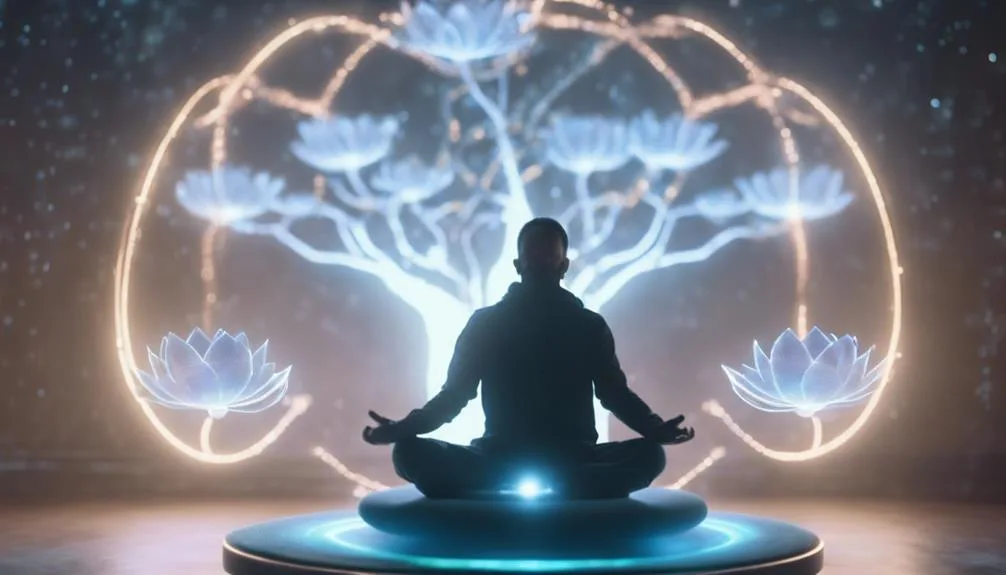The journey of meditation from its ascetic origins in ancient traditions to its present-day status as a global phenomenon encapsulates a fascinating evolution. This trajectory not only mirrors the changing contours of human society but also reflects an adaptive response to the increasingly complex demands of modern life.
As we explore the transition from meditation's spiritual and religious roots to its contemporary applications in health and wellness, a question arises: How has this age-old practice maintained its core essence while evolving to become a versatile tool for both spiritual enlightenment and secular well-being?
This unfolding narrative invites further exploration into the nuanced ways meditation continues to shape, and be shaped by, the world around us.
Key Takeaways
- Modern meditation adapts to busy lifestyles, offering flexible practice times and locations.
- Meditation evolves beyond religious ties, welcoming both spiritual and secular practitioners.
- Techniques have diversified, incorporating flexible postures and personalized approaches.
- Both traditional and modern practices prove effective, underscoring meditation's adaptability over time.
Historical Roots of Meditation
The practice of meditation, with its tranquil roots deeply embedded in ancient civilizations, has evolved over millennia to become a cornerstone of spiritual and mental well-being.
Tracing back to its ancient origins, meditation was integral to the spiritual fabric of societies in India, China, and beyond, serving as a conduit for enlightenment and inner peace. These early meditative traditions laid the groundwork for a myriad of practices that emphasized mindfulness, contemplation, and the cultivation of a harmonious inner world.
As these practices crossed cultural and geographical boundaries, they retained their core essence while adapting to the spiritual and philosophical landscapes of their new homes. This rich tapestry of history showcases meditation's enduring relevance and its capacity to bridge the human experience across time and space.
Modern Meditation Adaptations
In an era of incessant noise and unyielding schedules, modern meditation adaptations emerge as serene sanctuaries for the mind, evolving to meet the demands of contemporary life. These adaptations offer a harmonious blend of ancient wisdom and modern practicality, embodying the principles of mindful movement and daily mindfulness. They are designed to be seamlessly integrated into the rhythm of daily life, allowing individuals to cultivate peace and clarity amid the chaos.
Meditation Across Cultures

Meditation's journey across diverse cultures showcases its universal appeal, transcending geographical and societal boundaries to become a globally embraced practice. This widespread acceptance highlights the significant role of cultural influences in shaping the evolution of meditation.
Through global practices, meditation has morphed into a tapestry of techniques, each bearing the imprint of its cultural origins. From the serene Zen gardens of Japan to the bustling streets of New York City, meditation has adapted, proving its versatility and relevance in various contexts.
These cultural exchanges have not only enriched the practice but have also fostered a sense of unity among practitioners worldwide, demonstrating that despite differences, the quest for inner peace is a common thread binding humanity.
Spiritual and Secular Practices
Exploring the realms of spiritual and secular practices reveals how meditation serves as a bridge, uniting diverse individuals in their quest for tranquility and self-awareness. This convergence dispels common meditation misconceptions, highlighting its universal applicability beyond spiritual confines.
Historically rooted in religious traditions, meditation today transcends these origins, addressing the secular individual's need for peace amidst chaos. The spiritual vs secular debate in meditation is rendered obsolete as modern practices emphasize personalization over dogma.
This evolution reflects a broader understanding of meditation's role in human well-being, accommodating both the seeker of spiritual enlightenment and the pragmatist aiming for stress reduction. Through this inclusive approach, meditation emerges as a versatile tool for nurturing the mind, irrespective of one's spiritual or secular leanings.
The Science of Stillness

The science of stillness delves into how meditation's quietude impacts the human brain, offering profound benefits for mental and physical health.
Mindfulness research has illuminated the complex yet harmonious mind-body connection, revealing meditation's ability to lower stress levels, enhance cognitive function, and improve emotional well-being.
Through the disciplined practice of stillness, individuals tap into a state of mindfulness that fosters a deepened awareness of the present moment. This awareness, in turn, cultivates an environment where physiological stress responses are mitigated, leading to reductions in anxiety, depression, and chronic pain.
The scientific community continues to explore this ancient practice, uncovering evidence that supports meditation as a foundational tool for sustaining health and fostering resilience in the face of life's challenges.
Diverse Techniques Explored
Delving into the myriad of meditation techniques reveals a rich landscape of practices tailored to meet the diverse needs and preferences of individuals worldwide.
Among these, mindful movement and sound therapy stand out for their adaptability and effectiveness. Mindful movement, a gentle practice, integrates physical activity with mindfulness, enabling practitioners to cultivate awareness and tranquility through motion. This approach is particularly beneficial for those seeking a dynamic form of meditation that harmonizes body and mind.
Sound therapy, on the other hand, employs vibrations and rhythmic sounds to foster a deep state of relaxation. Its soothing nature makes it an excellent choice for individuals looking to reduce stress and enhance emotional balance.
Together, these techniques exemplify the evolution of meditation into a versatile tool for well-being.
Personalizing Your Practice

In an era where individuality is celebrated, personalizing your meditation practice emerges as a key step towards achieving a harmonious balance between mind, body, and spirit. Mindful customization of one's meditation journey is not merely a preference but a pathway to deeper self-awareness and fulfillment.
Individualized approaches allow practitioners to adapt meditation to their unique lifestyles, beliefs, and intentions, creating a practice that resonates on a personal level. This customization can include choosing the setting, duration, technique, and whether to meditate silently or with guidance.
Embracing such adaptability fosters a deeper connection to the practice, enhancing its benefits and making it a truly integral part of one's daily routine. By personalizing meditation, individuals can navigate their paths to tranquility and self-discovery with authenticity and purpose.
Health and Wellness Benefits
Building on the foundation of personalizing your meditation practice, it's essential to explore how this tailored approach significantly enhances health and wellness benefits. By adapting meditation techniques to fit individual needs and lifestyles, practitioners can experience profound improvements in several key areas:
- Stress Management: Regular meditation aids in reducing the body's response to stress, promoting relaxation and decreasing anxiety levels.
- Emotional Balance: It fosters a greater sense of calm and stability, helping individuals maintain emotional equilibrium even in challenging situations.
- Improved Focus: Personalized meditation practices enhance cognitive functions, leading to better concentration and clarity of thought.
- Physical Health: Beyond mental well-being, meditation has been linked to lower blood pressure, improved sleep patterns, and a stronger immune system.
These benefits illustrate the comprehensive impact of meditation on health and wellness, underscoring its importance in modern life.
The Future of Meditation

As we gaze into the evolving landscape of meditation, it is evident that future practices will increasingly intertwine with technological advancements, offering novel ways to enhance personal well-being and mindfulness.
| Aspect | Current State | Future Innovations |
|---|---|---|
| Techniques | Flexible, diverse | AI-customized practices |
| Tools | Apps, wearables | Immersive VR environments |
| Accessibility | Broad | Universal with tech integration |
| Personalization | Limited | Deeply tailored experiences |
These innovations promise a future where meditation becomes more accessible, personalized, and integrated into our daily lives than ever before. The intersection of spirituality and technology heralds a new era for meditation, where ancient wisdom and future innovations create pathways to inner peace and mindfulness for all, reshaping our approach to personal well-being.
Frequently Asked Questions
What Role Does Technology Play in Modern Meditation Practices, and How Does It Differ From Traditional Meditation Techniques?**
Technology enhances modern meditation practices through app meditation trends, offering accessibility and variety. It contrasts with traditional techniques by integrating digital tools, yet it sparks digital detox debates about technology's role in achieving mindfulness and serenity.
How Do Environmental Factors, Such as Living in Urban Versus Rural Areas, Affect the Practice and Benefits of Meditation?**
Environmental factors profoundly shape meditation practices; urban dwellers combat cacophonous noise pollution, seeking solace in fleeting green spaces, whereas rural residents bask in serene environments, effortlessly integrating meditation into their inherently peaceful surroundings, enriching the practice's benefits.
Can Meditation Influence Creativity and Productivity, and if So, in What Ways?**
Meditation can significantly enhance creativity and productivity by fostering the development of new neural pathways. This process facilitates artistic inspiration, leading to innovative ideas and solutions, demonstrating meditation's profound impact on cognitive and creative capacities.
How Does the Practice of Meditation Impact Interpersonal Relationships and Communication Skills?**
The practice of meditation positively impacts interpersonal relationships and communication skills through the modulation of brain chemistry, leading to stress reduction. This fosters a more empathetic, patient, and understanding approach towards others, enhancing social interactions and connections.
What Are the Challenges and Criticisms Faced by the Modern Meditation Movement, Especially Regarding Commercialization and Authenticity?**
The modern meditation movement faces challenges including commercialization, which may dilute its authenticity, and criticisms like perpetuating meditation myths and historical inaccuracies. These issues necessitate a discerning approach to practice and instruction.
Conclusion
In the ever-unfolding tapestry of human experience, meditation emerges as a timeless thread, weaving through the fabric of history to meet the evolving tapestry of modern life.
This ancient practice, once rooted in the quiet corners of spiritual endeavor, has blossomed into a myriad of forms, each a petal reflecting the diverse needs and cultures of its practitioners.
As science and spirituality entwine like vines around the sturdy trunk of meditation, the promise of increased well-being and inner peace offers a leafy canopy under which all may find shelter.
The future of meditation, rich with potential and versatility, promises to further enrich this vibrant landscape, ensuring that this ancient practice remains a vital and nourishing force in the garden of human wellness.

